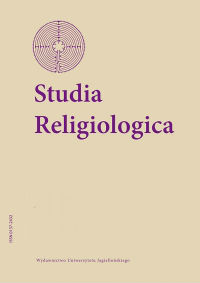Bóstwo bezmocne i dusze błądzące. Boski paradygmat dybuka w rosyjskim oryginale Pomiędzy dwoma światami Szymona An-skiego
The Powerless Godhead and Wandering Souls. The Dybbuk’s Divine Paradigm in the Russian Original of Between Two Worlds by S. An-sky
Author(s): Katarzyna Kornacka-SarełoSubject(s): Theatre, Dance, Performing Arts, Jewish studies, Jewish Thought and Philosophy, Philosophy of Religion, Cultural Anthropology / Ethnology
Published by: Wydawnictwo Uniwersytetu Jagiellońskiego
Keywords: S. An-sky; Between the Two Worlds: The Dybbuk, the Dybbuk phenomenon; Kabbalistic Godhead; Shekhinah; Heterodoxy in Judaism; Hasidism; Jewish theater; Jewish ethnography; Philosophy of religion;
Summary/Abstract: In this paper I demonstrate the concept of the Jewish godhead as presented in the drama Between Two Worlds: The Dybbuk by S. An-sky (Shloyme Zanvl Rappoport), and analyses the phenomenon of a dybbuk, which was very popular in the culture of Hasidim. It should be mentioned that the research subject became the Russian original of the text of An-sky’s drama. The text was found in St Petersburg in 2001. The original differs significantly from its Yiddish and Hebrew versions: the Russian version ofThe Dybbuk is preceded by a long “Prologue”, where the play’s author suggests its most important ideas to the viewers. Thus, the reinterpretation of An-sky’s drama, seen from a philosophical perspective, enables one to justify the thesis that the author was conscious of some incoherency intrinsically present in the realm of the religious beliefs of Hasidic communities, where both the God of Biblical and Talmudic narratives, and the impersonal godhead of Kabbalah were, simultaneously, worshiped. What is more: the author also focuses on the weakness of the godhead, as he or she has been deprived of his or her primordial, male-female, unity. At the same time, while analyzing An-sky’s text, I draw attention to the fact that in this play a dybbuk, an evil spirit existing in a living person’s body, is portrayed as a much better entity: An-sky’s dybbuk is a soul of a man who died prematurely, and who is wandering and missing his earthly lover, similarly to Shekhinah, who is missing her lover in heaven, and is wandering in exile, together with the Jewish nation.
Journal: Studia Religiologica. Zeszyty Naukowe Uniwersytetu Jagiellońskiego
- Issue Year: 49/2016
- Issue No: 2
- Page Range: 179-192
- Page Count: 14
- Language: Polish

